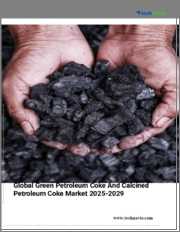
|
시장보고서
상품코드
1806265
석유 코크스 시장 : 제품 유형, 형상, 황 함유량, 용도, 최종사용자 산업, 유통 채널별 - 세계 예측(2025-2030년)Petroleum Coke Market by Product Type, Form, Sulfur Content, Application, End-User Industry, Distribution Channel - Global Forecast 2025-2030 |
||||||
석유 코크스 시장은 2024년에는 235억 8,000만 달러로 평가되었습니다. 2025년에는 249억 4,000만 달러에 이르고, CAGR 5.82%로 성장하여 2030년에는 331억 2,000만 달러에 달할 것으로 예측됩니다.
| 주요 시장 통계 | |
|---|---|
| 기준 연도 : 2024년 | 235억 8,000만 달러 |
| 추정 연도 : 2025년 | 249억 4,000만 달러 |
| 예측 연도 : 2030년 | 331억 2,000만 달러 |
| CAGR(%) | 5.82% |
석유 코크스 산업 환경의 전략적 기반과 세계 산업 연료 및 탄소 응용 분야에서 석유 코크스의 중요한 역할에 대해 알아봅니다.
석유 코크스 시장은 진화하는 산업 요구 사항과 각 지역의 소비 패턴에 힘입어 세계 에너지 및 탄소 소재 부문의 매우 중요한 축으로 부상하고 있습니다. 이 소개에서는 석유 코크스 생산과 이용의 핵심 역학에 대해 개괄적으로 설명하고, 정제 공정에서 여러 최종 사용 산업에 걸친 다양한 용도에 이르기까지 그 기원을 추적합니다. 원유 정제를 통해 다양한 분획을 얻을 수 있지만, 무거운 잔류물이 코크스화 반응을 일으켜 탄소를 많이 함유한 이 물질이 생성됩니다. 이 물질은 고온 작업에서 비용 효율적인 연료로, 그리고 탄소 첨가제 제조업체의 중요한 원료로 작용합니다. 석유 코크스 공급, 품질 편차 및 규제 환경의 미묘한 차이를 이해하는 것이 밸류체인의 각 단계의 이해관계자에게 필수적인 이유는 바로 이 두 가지 역할 때문입니다.
환경 규제, 기술 혁신, 세계 무역 재편이 석유 코크스의 경쟁 역학을 어떻게 재정의하고 있는지에 대해 알아봅니다.
지난 10년간 석유 코크스 시장은 경쟁 조건을 재정의하는 변화를 목격했습니다. 주요 시장의 환경 규제가 강화됨에 따라 저유황 제품의 채택이 가속화되면서 정유사들은 코크스화 기술을 최적화하고 유황 회수 솔루션을 통합해야 합니다. 동시에, 이방성 니들 코크스 생산의 발전으로 전극 제조업체는 전도성과 구조적 성능을 향상시켜 전기로 제강용 흑연 전극 부문에 대한 새로운 수요를 창출할 수 있게 되었습니다.
2025년 미국 관세 체계가 석유 코크스 공급망 비용 구조와 무역 흐름에 미치는 원거리 영향 분석
2025년 미국이 새로운 관세를 도입함에 따라 국제 석유 코크스 생태계 전체에 파급효과가 발생하여 생산자와 소비자는 조달 전략을 재검토해야 했습니다. 정책 입안자들은 특정 등급과 원산지에 높은 관세를 부과함으로써 국내 정제 능력을 보호하는 동시에 현지 탈탄산 및 부가가치 향상을 촉진하는 것을 목표로 했습니다. 이 조치로 인해 무역 경로가 재편되고, 영향을 받지 않는 지역공급업체들은 더 유리한 관세 제도가 있는 시장으로 출하를 전환하게 되었습니다.
제품 순도 형상 유황 임계값 용도 산업별, 유통망 통합으로 시장 성장 촉진요인의 핵심을 파악합니다.
석유 코크스 시장을 여러 세분화 렌즈를 통해 분석하면 제품 카테고리, 형태, 유황 임계값, 최종 용도, 산업 수직, 유통 네트워크에 걸쳐 미묘한 시장 성장 촉진요인이 드러납니다. 제품 유형을 살펴보면, 소성 코크스는 순도와 입자 균일성으로 인해 높은 가치를 유지하고 있으며, 연료용 코크스는 에너지 집약형 사업 수요를 뒷받침하고 있음을 알 수 있습니다. 형태적 변화를 고려할 때, 벌집 구조는 야금 공정에서 반응성을 높이고, 니들 코크스의 독특한 결정 배열은 고성능 흑연 전극에서 그 역할을 지원합니다.
주요 석유 코크스 시장의 정제 능력의 지역적 변화 및 인프라 개발 및 소비 동향에 대한 검토
석유 코크스 시장의 지역 역학은 지역 정책, 인프라 투자, 소비 패턴이 어떻게 상호 작용하여 수요 및 공급의 균형을 형성하는지 명확하게 보여줍니다. 북미와 남미에서는 환경 규제로 인해 정유사들이 선진적인 황 규제를 도입해야 함에도 불구하고, 미국과 브라질에서 코커가 크게 확장되어 수출 능력이 강화되었습니다. 동시에 국내 시멘트 부문과 전력 부문은 저유황 연료 코크스를 혼합 에너지 전략에 통합하여 정유소의 추가 개조를 촉진하는 동시에 안정적인 인수량을 유지하고 있습니다.
석유 코크스 시장에서 통합 생산자 기술과 라이센서 트레이더 및 통합 전략이 석유 코크스 시장에서 어떻게 선도적인 위치를 형성하고 있는지 평가합니다.
석유코크스 부문의 주요 기업들은 성장 기회를 포착하고 새로운 리스크를 줄이기 위해 다양한 전략을 실행하고 있습니다. 종합석유메이저는 복잡한 정유공장 내 코커 처리 능력을 지속적으로 최적화하고, 업스트림 지위를 활용하여 안정적인 원유 품질을 보장하는 한편, 진화하는 배출 기준을 충족하기 위해 황 제거 혁신을 전개하고 있습니다. 독립적인 탈탄 전문업체는 비용 효율적인 로터리 킬른 운영과 흑연 전극 제조업체와의 전략적 제휴를 통해 차별화를 꾀하고 장기적인 인수 계약을 보장합니다.
유연한 조달 데이터 기반 가격 책정 및 협력적 가치사슬 통합으로 기술 탈탄소화를 위한 적극적 길을 열다.
업계 리더는 진화하는 석유 코크스 환경에서 경쟁 우위를 확보하기 위해 적극적인 자세를 취해야 합니다. 첫째, 탈탄소 기술에 대한 투자를 진행하는 것이 중요합니다. 기존 코커 유닛을 황 회수 및 결합 솔루션으로 개조함으로써 기업의 지속가능성을 높이고, 까다로운 지역 시장에 대한 접근성을 확보할 수 있습니다. 동시에 마이크로파 및 플라즈마를 이용한 탈탄산 기술 혁신 기업과의 제휴는 중기적으로 운영비용과 배출원단위 감소를 약속합니다.
광범위한 2차 조사와 1차 경영진 인터뷰 및 기술 전문가들의 동료 검토를 결합하여 신뢰할 수 있고 실행 가능한 석유 코크스에 대한 통찰력을 제공합니다.
이 조사방법은 종합적인 2차 데이터 분석과 타겟팅된 1차 인터뷰가 결합된 엄격한 방법을 활용하여 확실하고 실행 가능한 시장 인사이트를 제공합니다. 소개, 업계 보고서, 규제 당국 신고서, 재무제표 등 일반적으로 이용 가능한 리소스를 광범위하게 검토하여 정제 능력, 세계 무역 흐름, 제품 사양에 대한 기초적인 개요를 제공했습니다. 탈탄산 및 황 제어 기술의 최신 발전 상황을 파악하기 위해 자체 백서 및 특허 데이터베이스도 조사했습니다.
시장 역학 통합 석유 코크스의 미래 기회를 밝히기 위한 기술 개발 및 규제 과제 분석
석유 코크스 산업은 비용 효율적인 열 연료 및 탄소 첨가제 적용에 있어 기존의 장점과 환경 관리 및 공급망 복원력에 대한 요구가 교차하는 교차로에 서 있습니다. 규제 환경의 변화, 기술적 혁신이 이뤄지는 가운데, 이해관계자들은 단기적인 경영 효율성과 탈탄소화, 수직적 통합과 같은 장기적인 전략적 투자 사이에서 균형을 맞추어야 합니다.
목차
제1장 서론
제2장 분석 방법
제3장 주요 요약
제4장 시장 개요
제5장 시장 역학
제6장 시장 인사이트
- Porter's Five Forces 분석
- PESTEL 분석
제7장 미국 관세의 누적 영향 2025
제8장 석유 코크스 시장 : 제품 유형별
- 소성 코크스
- 연료 등급
제9장 석유 코크스 시장 : 형태별
- 허니콤 코크스
- 니들 코크스
- 쇼트 코크스
- 스펀지 코크스
제10장 석유 코크스 시장 : 황 함유량별
- 고황(4% 이상)
- 저황(2% 미만)
- 중황(2-4%)
제11장 석유 코크스 시장 : 용도별
- 양극 생산
- 탄소 첨가제
- 화확원료
- 연료
- 시멘트 가마
- 발전소
- 흑연 전극
제12장 석유 코크스 시장 : 최종사용자 업계별
- 화학제품
- 건설업
- 에너지 및 유틸리티
- 철강 및 야금
제13장 석유 코크스 시장 : 유통 채널별
- 오프라인
- 온라인
- 기업 웹사이트
- E-Commerce 플랫폼
제14장 아메리카의 석유 코크스 시장
- 미국
- 캐나다
- 멕시코
- 브라질
- 아르헨티나
제15장 유럽, 중동 및 아프리카의 석유 코크스 시장
- 영국
- 독일
- 프랑스
- 러시아
- 이탈리아
- 스페인
- 아랍에미리트(UAE)
- 사우디아라비아
- 남아프리카공화국
- 덴마크
- 네덜란드
- 카타르
- 핀란드
- 스웨덴
- 나이지리아
- 이집트
- 튀르키예
- 이스라엘
- 노르웨이
- 폴란드
- 스위스
제16장 아시아태평양의 석유 코크스 시장
- 중국
- 인도
- 일본
- 호주
- 한국
- 인도네시아
- 태국
- 필리핀
- 말레이시아
- 싱가포르
- 베트남
- 대만
제16장 경쟁 구도
- 시장 점유율 분석(2024년)
- FPNV 포지셔닝 매트릭스(2024년)
- 경쟁 분석
- BP plc
- Chevron Corporation
- Cenovus Inc.
- China National Petroleum Corporation
- China Petroleum & Chemical Corporation
- Exxon Mobil Corporation
- GrafTech International Ltd.
- HF Sinclair Corporation
- Indian Oil Corporation
- O.K.K. Koksovny, a.s.
- Petrobras
- Phillips 66 Company
- PJSC LUKOIL
- PJSC Rosneft Oil Company
- Rain Carbon Inc.
- Reliance Industries Limited
- Renelux Cyprus Ltd.
- Saudi Arabian Oil Company
- Shell plc
- TotalEnergies SE
- Trammo, Inc.
- Valero Energy Corporation
제18장 리서치 AI
제19장 리서치 통계
제20장 리서치 컨택트
제21장 리서치 기사
제22장 부록
LSH 25.09.17The Petroleum Coke Market was valued at USD 23.58 billion in 2024 and is projected to grow to USD 24.94 billion in 2025, with a CAGR of 5.82%, reaching USD 33.12 billion by 2030.
| KEY MARKET STATISTICS | |
|---|---|
| Base Year [2024] | USD 23.58 billion |
| Estimated Year [2025] | USD 24.94 billion |
| Forecast Year [2030] | USD 33.12 billion |
| CAGR (%) | 5.82% |
Unveiling the Strategic Foundations of the Petroleum Coke Industry Landscape and Its Critical Role in Global Industrial Fuel and Carbon Applications
The petroleum coke market has emerged as a pivotal pillar in global energy and carbon materials sectors, driven by evolving industrial requirements and regional consumption patterns. This introduction outlines the core dynamics behind the production and use of petroleum coke, tracing its origins from refining processes to its diverse applications across multiple end-use industries. As crude oil refining yields various fractions, the heavier residuals undergo coking units, generating this carbon-rich material that serves as a cost-efficient fuel in high-temperature operations as well as a critical feedstock for carbon additive manufacturers. These dual roles highlight why understanding the nuances of petroleum coke supply, quality variations, and regulatory environments is essential for stakeholders at every node of the value chain.
Within the broader energy transition landscape, petroleum coke continues to occupy a unique position. While sustainability objectives have pressured many hydrocarbon-derived products, demand for low-sulfur grades in power generation and cement kilns remains robust, even as sponge coke and needle coke maintain strategic importance for specialty graphite electrode production. This multifaceted nature calls for a deep dive into shifting trade flows, environmental compliance requirements, and technological innovations. Ultimately, this section lays the groundwork for a detailed exploration of the transformative shifts, tariff impacts, segmentation insights, and regional perspectives that will shape decision-making for producers, traders, end users, and investors.
Exploring How Environmental Regulations Technological Innovations and Global Trade Realignments Are Redefining Petroleum Coke Competitive Dynamics
Over the past decade, the petroleum coke market has witnessed transformative shifts that are redefining its competitive contours. Emerging environmental regulations in key markets have accelerated adoption of low-sulfur variants, compelling refiners to optimize coking technologies and integrate sulfur capture solutions. Concurrently, advances in anisotropic needle coke production have enabled electrode manufacturers to achieve enhanced conductivity and structural performance, thereby spurring fresh demand in the graphite electrode segment for electric arc furnace steelmaking.
Trade realignments have also emerged as a central theme, with traditional exporters in North America recalibrating their strategies in response to rising domestic refinery throughput and tightening environmental standards. Simultaneously, Asian refining hubs have expanded coker capacities to secure feedstocks for local carbon additive production, reducing reliance on imported calcined coke. Technological breakthroughs in microwave calcination have begun to gain traction, offering energy efficiency gains and reduced emissions compared to conventional rotary kilns. These innovations not only align with corporate sustainability commitments but also cater to increasingly stringent customer specifications.
As a result, the competitive landscape is evolving from a commoditized fuel market into a sophisticated ecosystem where product purity, particle morphology, and localized logistics networks determine profitability. Stakeholders who anticipate these shifts and invest in advanced processing capabilities will be positioned to capitalize on premium segments and forge resilient supply chains.
Analyzing the Far-Reaching Consequences of the 2025 United States Tariff Framework on Petroleum Coke Supply Chains Cost Structures and Trade Flows
The introduction of new United States tariffs in 2025 has created a ripple effect across the international petroleum coke ecosystem, compelling producers and consumers to reevaluate sourcing strategies. By imposing higher duties on specific grades and origins, policy makers aimed to protect domestic refining capacity while encouraging local calcination and value addition. This measure has reshaped trade routes, with suppliers in unaffected regions redirecting shipments to markets with more favorable duty regimes.
Consequently, domestic processors have accelerated investments in onshore calcination facilities to capture value that previously flowed overseas. This shift has strengthened local supply chains but also introduced capacity constraints, driving premiums for certain calcined products. Importers in allied regions have responded by diversifying vendor portfolios and renegotiating long-term contracts to mitigate exposure to tariff volatility. At the same time, end users dependent on high-quality needle coke for graphite electrode production have faced incremental cost adjustments, prompting downstream manufacturers to pursue strategic partnerships and joint ventures with integrated petroleum coke producers to ensure consistent feedstock availability.
In tandem, secondary trade corridors have materialized as traders leverage bonded warehouses and free trade zones to minimize tariff impact. While these workarounds provide short-term relief, they underscore the importance of transparent cost modeling and agile logistics networks. Ultimately, the cumulative effect of the 2025 tariff framework has elevated supply chain resilience and vertical integration from optional strategies to core imperatives for market participants.
Illuminating Core Market Drivers by Integrating Product Purity Morphological Forms Sulfur Thresholds Applications Industry Verticals and Distribution Networks
Dissecting the petroleum coke market through multiple segmentation lenses illuminates the nuanced performance drivers across product categories, morphological forms, sulfur thresholds, end-use applications, industry verticals, and distribution networks. Examining product types reveals that calcined coke continues to attract higher value due to its purity and particle uniformity, while fuel grade coke sustains demand in energy-intensive operations. Considering morphological variations, the honeycomb structure enhances reactivity in metallurgical processes, whereas needle coke's unique crystalline alignment underpins its role in high-performance graphite electrodes.
Sulfur content remains a critical quality parameter, as high-sulfur grades face stricter emission controls in combustion applications, making mid-sulfur and low-sulfur variants increasingly sought after for cement kiln usage and power plant co-firing. Application insights indicate that beyond its traditional role as a thermal fuel, petroleum coke functions as a foundational feedstock for anode production and chemical intermediates, driving incremental innovation in carbon additive formulations. In the context of end-user industries, chemical producers leverage its carbon content for process intensification, construction materials providers exploit its high calorific value, utilities integrate low-sulfur grades into blended fuel portfolios, and steelmakers depend on ultra-low impurities for electrode manufacturing.
Distribution channel dynamics have also evolved, with offline trade remaining predominant for large bulk transactions while online platforms, including direct company channels and e-commerce portals, facilitate smaller volume purchases and enable real-time price discovery. Understanding these intersecting segmentation vectors is essential for stakeholders seeking to optimize product positioning and tailor supply chain solutions.
Examining Regional Transformations in Refining Capacities Infrastructure Developments and Consumption Trends Across Major Petroleum Coke Markets
Regional dynamics in the petroleum coke market underscore how local policies, infrastructure investments, and consumption patterns interact to shape supply-demand equilibria. In the Americas, significant coker expansions in the United States and Brazil have bolstered export capacities even as environmental regulations pressure refiners to adopt advanced sulfur control measures. Simultaneously, domestic cement and power sectors have integrated low-sulfur fuel coke into blended energy strategies, sustaining steady off-take while incentivizing further refinery upgrades.
Across Europe, the Middle East, and Africa, shifting import dependencies have heightened the role of Mediterranean terminals and Red Sea transshipment hubs. European refineries have prioritized needle coke production to serve the continent's robust graphite electrode industry, whereas Gulf refining clusters leverage abundant feedstocks to supply regional power plants and export corridors. In North Africa and Sub-Saharan Africa, emerging infrastructure projects in cement manufacturing and steel production are gradually increasing local consumption, though logistics constraints remain a challenge for inland markets.
The Asia-Pacific region continues to outpace other geographies in refining throughput and coker utilization, driven by China, India, and Southeast Asian economies. Investments in domestic calcination lines are expanding as manufacturers seek to reduce reliance on exports and improve supply chain agility. Regional port modernizations and inland rail linkages in Australia and Indonesia have further enhanced trade flows, bridging production centers with end-users in high-growth industrial hubs. A comprehensive understanding of these regional narratives is key to anticipating market entry opportunities and identifying areas for strategic capacity deployment.
Evaluating How Integrated Producers Technology Licensors Traders and Consolidation Strategies Are Shaping Leadership Positions in the Petroleum Coke Market
Leading companies in the petroleum coke sector are executing diverse strategies to capture growth opportunities and mitigate emerging risks. Integrated oil majors continue to optimize coker throughput within complex refineries, leveraging their upstream positions to secure consistent crude quality while deploying sulfur removal innovations to meet evolving emission standards. Independent calcination specialists differentiate through cost-efficient rotary kiln operations and strategic partnerships with graphite electrode manufacturers to guarantee long-term offtake agreements.
Technology providers have made significant inroads by licensing advanced microwave-based calcination systems that deliver enhanced energy efficiency and reduced carbon footprints. Meanwhile, regional trading houses have expanded service offerings to include inventory financing and risk management solutions, enabling smaller end users to navigate price volatility and logistical bottlenecks without significant capital outlays. Collaborative ventures are emerging between chemical companies and petroleum coke processors to develop proprietary carbon additive blends tailored for specialty applications, illustrating a shift toward co-innovation models.
Consolidation activity has also intensified as market participants seek scale and vertical integration to withstand tariff pressures and supply chain disruptions. Mergers involving mid-sized calcination firms and larger petrochemical conglomerates have unlocked synergies in procurement, production planning, and distribution network optimization. Such strategic realignments highlight the industry's move toward end-to-end control of product quality and logistics, positioning these key players for resilience in an increasingly dynamic operating environment.
Charting a Proactive Path with Technological Decarbonization Flexible Procurement Data-Driven Pricing and Collaborative Value-Chain Integration
Industry leaders must adopt a proactive posture to secure competitive advantage in the evolving petroleum coke landscape. First, advancing investments in decarbonization technologies will be vital: retrofitting existing coker units with sulfur capture and binding solutions can unlock access to stringent regional markets while enhancing corporate sustainability credentials. Simultaneously, partnerships with technology innovators for microwave or plasma-based calcination promise to reduce operational costs and emissions intensity over the medium term.
Second, embracing flexible procurement models can mitigate tariff and logistical risks. Establishing multi-region sourcing frameworks and bonded inventory structures allows rapid reallocation of raw feedstocks in response to policy changes or supply chain disruptions. Leveraging data-driven analytics for real-time cost-margin visibility will empower commercial teams to optimize pricing strategies and contract durations more effectively.
Third, deepening collaboration with downstream consumers through co-development agreements for specialized carbon additives will create differentiated value propositions. By integrating forward into anode and electrode fabrication processes, producers can secure guaranteed offtake and capture incremental margin pools. Finally, strengthening digital platforms for order management, traceability, and customer engagement will drive operational transparency and support rapid scaling of online distribution channels, catering to smaller volume purchasers and enhancing overall market responsiveness.
Combining Extensive Secondary Research Primary Executive Interviews and Technical Expert Peer Reviews to Deliver Credible and Actionable Petroleum Coke Insights
This research leverages a rigorous methodology combining comprehensive secondary data analysis with targeted primary interactions to deliver robust, actionable market insights. Initially, an extensive review of publicly available resources such as industry reports, regulatory filings, and financial statements provided the foundational overview of refining capacities, global trade flows, and product specifications. Proprietary white papers and patent databases were also examined to capture the latest advancements in calcination and sulfur control technologies.
Complementing this desk research, primary interviews with senior executives from refinery operators, calcination specialists, trading firms, and end-user companies were conducted to validate key trends and understand emerging strategic priorities. These interactions spanned qualitative discussions on regional policy impacts as well as quantitative assessments of operational performance metrics. Furthermore, a panel of technical experts in carbon materials and energy markets offered peer reviews to ensure accuracy and relevance of the findings.
Data triangulation techniques were employed to cross-verify information across multiple sources, enhancing credibility and minimizing bias. All insights were synthesized through a structured framework that maps drivers, constraints, and strategic imperatives, resulting in a coherent narrative designed to support informed decision-making across the value chain.
Synthesizing Market Dynamics Technological Developments and Regulatory Imperatives to Illuminate Future Opportunities in Petroleum Coke
The petroleum coke industry stands at a crossroads where traditional advantages in cost-effective thermal fuel and carbon additive applications meet the imperatives of environmental stewardship and supply chain resilience. As regulatory landscapes evolve and technological breakthroughs emerge, stakeholders must balance short-term operational efficiencies with long-term strategic investments in decarbonization and vertical integration.
Key market dynamics underscore the transition from commodity-driven exchanges to specialized, quality-focused transactions. The interplay between sulfur content requirements, morphological properties, and application-specific performance benchmarks will increasingly dictate competitive positioning. Regional infrastructure enhancements and tariff realignments further amplify the need for agile logistics networks and diversified sourcing.
Looking ahead, success will hinge on the ability of industry participants to harness advanced processing technologies, cultivate collaborative partnerships throughout the value chain, and deploy data-driven platforms for transparent supply chain management. By doing so, they will not only navigate the evolving market complexities but also unlock new value pools in an era defined by sustainability and innovation.
Table of Contents
1. Preface
- 1.1. Objectives of the Study
- 1.2. Market Segmentation & Coverage
- 1.3. Years Considered for the Study
- 1.4. Currency & Pricing
- 1.5. Language
- 1.6. Stakeholders
2. Research Methodology
- 2.1. Define: Research Objective
- 2.2. Determine: Research Design
- 2.3. Prepare: Research Instrument
- 2.4. Collect: Data Source
- 2.5. Analyze: Data Interpretation
- 2.6. Formulate: Data Verification
- 2.7. Publish: Research Report
- 2.8. Repeat: Report Update
3. Executive Summary
4. Market Overview
- 4.1. Introduction
- 4.2. Market Sizing & Forecasting
5. Market Dynamics
- 5.1. Emerging shift towards cleaner technologies in petroleum coke production processes
- 5.2. Integration of digital technologies in petroleum coke supply chain management
- 5.3. Increasing adoption of petroleum coke as a cost-effective fuel alternative in industries
- 5.4. Advancements in desulfurization techniques for cleaner petroleum coke
- 5.5. Fluctuating crude oil prices influencing the petroleum coke market dynamics
- 5.6. Strategic partnerships between petrochemical companies to innovate petroleum coke by-products and derivatives
- 5.7. Integration of petcoke with renewable energy projects to optimize energy output and cost
- 5.8. Rising investments in upgrading petroleum coke refining techniques for quality improvement
- 5.9. Growing environmental regulations impacting petroleum coke manufacturing standards
- 5.10. Increasing use of petroleum coke in cement production to reduce carbon footprint
6. Market Insights
- 6.1. Porter's Five Forces Analysis
- 6.2. PESTLE Analysis
7. Cumulative Impact of United States Tariffs 2025
8. Petroleum Coke Market, by Product Type
- 8.1. Introduction
- 8.2. Calcined Coke
- 8.3. Fuel Grade
9. Petroleum Coke Market, by Form
- 9.1. Introduction
- 9.2. Honeycomb Coke
- 9.3. Needle Coke
- 9.4. Shot Coke
- 9.5. Sponge Coke
10. Petroleum Coke Market, by Sulfur Content
- 10.1. Introduction
- 10.2. High-Sulfur (>4%)
- 10.3. Low-Sulfur (<2%)
- 10.4. Mid-Sulfur (2-4%)
11. Petroleum Coke Market, by Application
- 11.1. Introduction
- 11.2. Anode Production
- 11.3. Carbon Additives
- 11.4. Chemical Feedstock
- 11.5. Fuel
- 11.5.1. Cement Kilns
- 11.5.2. Power Plants
- 11.6. Graphite Electrodes
12. Petroleum Coke Market, by End-User Industry
- 12.1. Introduction
- 12.2. Chemical
- 12.3. Construction
- 12.4. Energy & Utilities
- 12.5. Steel & Metallurgy
13. Petroleum Coke Market, by Distribution Channel
- 13.1. Introduction
- 13.2. Offline
- 13.3. Online
- 13.3.1. Company Websites
- 13.3.2. E-commerce Platforms
14. Americas Petroleum Coke Market
- 14.1. Introduction
- 14.2. United States
- 14.3. Canada
- 14.4. Mexico
- 14.5. Brazil
- 14.6. Argentina
15. Europe, Middle East & Africa Petroleum Coke Market
- 15.1. Introduction
- 15.2. United Kingdom
- 15.3. Germany
- 15.4. France
- 15.5. Russia
- 15.6. Italy
- 15.7. Spain
- 15.8. United Arab Emirates
- 15.9. Saudi Arabia
- 15.10. South Africa
- 15.11. Denmark
- 15.12. Netherlands
- 15.13. Qatar
- 15.14. Finland
- 15.15. Sweden
- 15.16. Nigeria
- 15.17. Egypt
- 15.18. Turkey
- 15.19. Israel
- 15.20. Norway
- 15.21. Poland
- 15.22. Switzerland
16. Asia-Pacific Petroleum Coke Market
- 16.1. Introduction
- 16.2. China
- 16.3. India
- 16.4. Japan
- 16.5. Australia
- 16.6. South Korea
- 16.7. Indonesia
- 16.8. Thailand
- 16.9. Philippines
- 16.10. Malaysia
- 16.11. Singapore
- 16.12. Vietnam
- 16.13. Taiwan
17. Competitive Landscape
- 17.1. Market Share Analysis, 2024
- 17.2. FPNV Positioning Matrix, 2024
- 17.3. Competitive Analysis
- 17.3.1. BP plc
- 17.3.2. Chevron Corporation
- 17.3.3. Cenovus Inc.
- 17.3.4. China National Petroleum Corporation
- 17.3.5. China Petroleum & Chemical Corporation
- 17.3.6. Exxon Mobil Corporation
- 17.3.7. GrafTech International Ltd.
- 17.3.8. HF Sinclair Corporation
- 17.3.9. Indian Oil Corporation
- 17.3.10. O.K.K. Koksovny, a.s.
- 17.3.11. Petrobras
- 17.3.12. Phillips 66 Company
- 17.3.13. PJSC LUKOIL
- 17.3.14. PJSC Rosneft Oil Company
- 17.3.15. Rain Carbon Inc.
- 17.3.16. Reliance Industries Limited
- 17.3.17. Renelux Cyprus Ltd.
- 17.3.18. Saudi Arabian Oil Company
- 17.3.19. Shell plc
- 17.3.20. TotalEnergies SE
- 17.3.21. Trammo, Inc.
- 17.3.22. Valero Energy Corporation




















